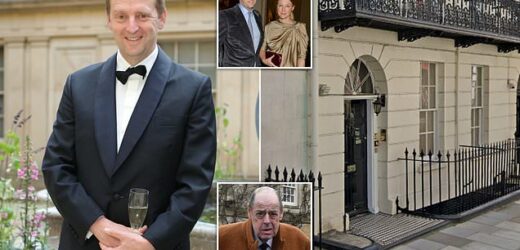London gentlemen’s club Pratt’s which inspired James Bond creator Ian Fleming will allow women to join for first time in 166 years
- The private member club owned by the family of Earl of Burlington since 1937
- Earl announced women are now admitted as guests and eligible for membership
London gentlemen’s club Pratt’s which inspired James Bond creator Ian Fleming will allow women to join for the first time in 166 years.
The private member club has been owned by the Earl of Burlington’s family since 1937 and women were not allowed to join – until now.
The Duke of Devonshire’s only son and heir, who has just moved into the family estate Chatsworth in Derbyshire, announced that ‘with immediate effect’, women would be admitted as guests and be eligible for a membership at Pratt’s.
The 53-year-old earl explained his decision in a letter sent to members by club secretary Colonel Sir Alexander ‘Sandy’ Malcolm, Bt, by stating that ‘extending membership to women is a positive, necessary and evolving change to enhance and invigorate the club’.
He added that he discussed the proposal with the chairman – former Tory Minister Nicholas [now Lord] Soames – as well as the committee ‘and others, who I am pleased to say support this change’.
The private member club has been owned by the Earl of Burlington’s (pictured) family since 1937 and women were not allowed to join – until now
The Duke of Devonshire’s only son and heir, who has just moved into the family estate Chatsworth in Derbyshire, announced that ‘with immediate effect’, women would be admitted as guests as well as be eligible for membership at Pratt’s (pictured)
However, the owner’s enthusiasm does not appear to be widely shared within the club, which occupies rooms in a basement in St James’s, Central London, and which partly inspired the fictional ‘Blades’ – 007’s club in Ian Fleming’s James Bond novels.
‘This email arrived overnight – there has been no consultation with the membership and no ballot,’ one member said, branding the change ‘a disgrace’.
He added: ‘In a world where there are few small pleasures, the rules governing membership at Pratt’s was one. It will be the end of Pratt’s as we know it.
The earl added that he discussed the proposal with the chairman – former Tory Minister Nicholas [now Lord] Soames (pictured) – and the committee ‘and others, who I am pleased to say support this change’
‘Lots of people will resign or simply stop coming in, which amounts to the same thing. And I happen to know that women have not been pressing for it.
‘At the moment, they can come in as guests for lunch. In the evening, it reverts to men only – or at least it did, and everyone was happy.’
The member said that ‘Bill Burlington’ – as the Earl opted to be known during his photographic career – ‘has never “got” Pratt’s’, where, by longstanding tradition, stewards were always known as George, regardless of their baptismal name.
This changed with the arrival of the first female steward, Margaret Ouroux, who became ‘Georgina’.
Traditionalists fear more radical developments at the club, which was established in 1857.
‘There was a rumour that Burlington wanted the place to became a version of 5 Hertford Street,’ a member explained, referring to Robin Birley’s Mayfair establishment, which boasts a nightclub, Loulou’s, in its basement. ‘Thankfully, that hasn’t happened – so far.’
A source close to the owners said: ‘The owners of Pratt’s believe that membership should be based on recommendation, not gender.
‘They hope that through this, and other positive changes, they can continue to enhance and invigorate the club.
‘There is a great deal of history to the club. And while being respectful to its traditions, the owners firmly believe this is a positive and necessary change and look forward to welcoming women as members.’
However, the owner’s enthusiasm does not appear to be widely shared within the club, which occupies rooms in a basement (pictured) in St James’s, Central London, and which partly inspired the fictional ‘Blades’ – 007’s club in Ian Fleming’s James Bond novels
Source: Read Full Article






